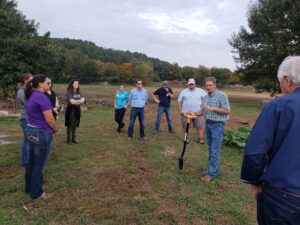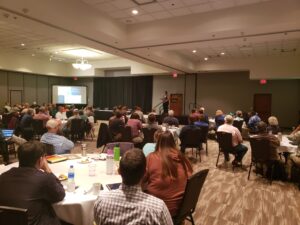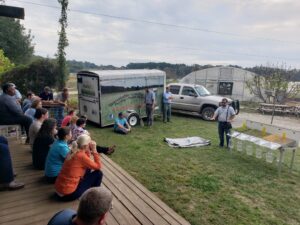Final report for ES19-150
Project Information
The goal of this project will be to establish and support a core group of Extension “Soil Health Service Providers” as part of a grower support network. This project has the full support of Clemson and South Carolina State Extension administrators who have made training in soil health a top priority for existing agriculture agents, and for future agents who begin careers in agricultural Extension. Currently in South Carolina there are a few “innovative” farmers who have tried and been successful testing new more sustainable approaches for soil health and fertility management including cultural methods such as cover cropping. However, most farmers are more risk averse and want ideas to be thoroughly tested before trying them out. Thus, there is a critical need for assistance to help these “middle adopters” implementing alternative soil health practices. Without a solid understanding of how cover crop benefits are directly related to soil biology, however, making sound cover crop management decisions for the long term is challenging, and cover cropping is just one element of a conservation cropping system that provides for sound soil health management. The proposed project will build upon previous research and outreach programs to provide in-depth, advanced soil health training and experiential learning with an emphasis on soil biology for selected South Carolina agricultural professionals. Graduates of the training will, in turn, provide outreach and assistance on soil health in their respective communities.
- Provide in-depth training and experiential learning in soil health with an emphasis on soil biology for a core group of committed agriculture professionals in South Carolina.
- Establish a cadre of Extension “Soil Health Service Providers” as part of a statewide grower support network around soil health.
- Create increases in awareness about the importance of soil health, soil health management, and practices to improve soil health among farmers and farm advisors.
- Promote self sufficiency among farmers in how to manage production fields for improved soil health, soil nutrient efficiency and to foster improved soil resilience and overall farm profitability.
Cooperators
- (Educator and Researcher)
- (Educator)
Education
At the start of the first year the project collaborators will organize a state conference devoted to soil health. The objective of the conference will be to generate excitement around the topic, discuss new developments in the science of soil health, and to promote the 2-year training project. Speakers will include soil health researchers, agriculture service providers who focus on soil health, and key farmers who have successfully implemented soil health practices. A session will be included where conferees will provide input on the future training curriculum and training methods. Following the conference a series of one-day workshops and soil health field days will be held across SC for up to 20 hand-picked SC Extension agents and other agriculture professionals with introductory soils training. In year two, trainees will provide outreach on soil health in their respective communities. The project is expected to reach at least 400 farmers, landowners, and their advisors.
Education & Outreach Initiatives
1) Discuss new scientific discoveries that inform the latest recommendations to build health soil;
2) Hear from farmers who have implemented innovative approaches for building a resilient system;
3) Engage with farmers, Extension personnel and other ag professionals to address soil health challenges and opportunities;
4) Provide tools for teaching soil health for agriculture professionals who work with farmers.
Agenda_day1_day2_Clemson_Soil_Health_Conference (PDF)
This conference was held on October 28th & 29th, 2019 at the Madren Conference Center & Inn and the Clemson University Student Organic Farm in Clemson, SC. Day one of the conference was designed for farmers, researchers, and ag professionals. Up to date information will be delivered by experts in the field, with breakout sessions on specific management practices in livestock, row crop and horticulture systems. General session topics include principles of soil health, soil biology, soil health indicators, economics, and more. Day two of the conference offered special extended programming, Tools for Teaching Soil Health, for agriculture professionals who work with farmers. CEUs were offered for Certified Crop Advisorys in attendance.
Soil Health Conference: Day 1 Agenda (please see attachment for complete agenda with session information and speakers names)
9:05 – 10:05 Back to The Future: A Historical Perspective on Soil Health
10:10 – 11:10 Principles of Soil Health: Is No-till Enough?
11:15 – 12:15 Biology of Regenerative Soils
12:15 – 1:15 LUNCH
1:15 – 2:15 Indicators: How to Evaluate Soil Health
2:20 – 3:45 Commodity Breakout Sessions: Specific Production Strategies for Managing Soil Health in Livestock, Horticulture, & Row Crops
Livestock - Soil Health Practices in Livestock Operations
Horticulture - Soil Health Practices in Horticulture Operation
Row Crops - Soil Health Practices in Row Crop Operations
3:45 – 4:30 Adaptation vs. Adoption: Dealing With the New Normal
4:35 – 5:30 Panel Discussion: Economics of Transitioning to Improved Soil Health Practices
Soil Health Conference: Day 2 Agenda (please see attachment for complete agenda with session information and speakers names)
8:15 – 9:45 Communicating with Growers: Panel Discussion
9:50 – 11:20 How to Measure and Test for Soil Health: There are options!
11:20 – 11:40 What tools are available?
11:45 – 12:45 LUNCH
Move to Hands on Activities: Techniques for In-field Assessment of Soil Health
12:45 – 2:30 Using Web Soil Survey and SoilWeb App (Lacy Adams)
2:30 – 3:00 Travel to Nearby Clemson Student Organic Farm
3:20 – 3:45 Rainfall Simulator; whole group demonstration (Kirsten Robertson)
3:45 – 4:30 Stations on Farm - Water Infiltration Test, Hands-On Soil Evaluation, "Walk the Field" Assessment
The conference was covered in publications after it's completion:
- https://news.clemson.edu/farmers-learn-the-science-of-soil-health-at-clemson-conference/
- https://www.no-tillfarmer.com/events/245-clemson-soil-health-conference-2019



Baseline knowledge of soil health was increased
Quantify, expand and verify the productivity and environmental benefits of the soil management systems used by cotton producers.
This was a soil health presentation by Dr. Buz Kloot offered to participants of the Clemson Soil Health Conference. Held on 12/10/2019, this webinar was developed for the Soil Health Institute in Greensboro, NC and addressed soil health in agronomic cotton farming . The event was recorded and is publicly available at: https://vimeo.com/412559657
Baseline knowledge of soil health was increased
Offer in depth information on the 5 soil health principles to Advanced Soil Health training
Dr. Buz Kloot lead a discussion for the the SC Grazing Lands Coalition. He was joined by Jason Carter, a row crop farmer, and Terry Chandler, a Georgia cattleman, to talk about soil health principles. This event was held on 2/29/2020 at the Abbeville County Extension Office in Abbeville, SC. The event was circulated among soil health stake holders in the state. One online video is available associated with this event: https://www.youtube.com/watch?v=kWDO_O3JUSI&list=PLogKHYJs3_aN7zy3l789b913NeLqG-bVu&index=1&t=51s
**COVID-19 restrictions significantly reduced the ability to carry out any any programming in the majority of 2020 however some online events were organized in 2020 through April 30, 2021:3/9/2021
Baseline knowledge of soil health was increased
Provide Advanced Soil Health training via webinar format
2/10/2021 - NCAT Soil health innovations conference On line
Dr. Buz Kloot presented Biological Soil Indicators and their Practical End Uses at ATTRA's first annual Soil Health Innovations Conference was held Monday and Tuesday, March 8 and 9, 2021. The virtual conference offered live, interactive talks, which were hailed by attendees as outstanding for their cutting-edge content and entertaining presentations. SC agricultural professionals who were unable to attend the conference are being offered the opportunity to access the entire conference recordings on the event management platform until September 5, 2021.
Baseline knowledge of soil health was increased
Provide Basics of Soil Health information via webinar format
Cooperative Extension Program Bi-States program offered their annual conference virtually in 2021. Dr. Buz Kloot provided an overview of soil health to participants of the conference held on 3/25/21. This event was shared with South Carolina Agricultural Professionals.
Baseline knowledge of soil health was increased
Provide in-depth information on each point of evaluation on the crop assessment sheet, including tutorial on how to fill out the form and reasoning why each step is relevant
A sixteen-video step-by-step breakdown of USDA's Cropland In-Field Soil Health Assessment worksheet. This series is a product of collaboration between Clemson University, The USDA-NRCS, and the University of South Carolina for USDA SARE Project ES19-150
The NRCS Cropland Soil Health Assessment worksheet can be used to assess soil-health related resource concerns in plant production systems. In this series of videos Nathan Lowder, NRCS Soil Health Division Specialist, and Gordon Mikell, NRCS Conservation Agronomist, walk viewers through each step of utilizing the assessment worksheet.
MORE ABOUT THE WORKSHEET: The Cropland In-Field Soil Health Assessment Guide was developed as a tool to evaluate the four soil health resource concerns on cropland. It guides the planner through a decision-making process for various soil health indicators by utilizing decision trees to identify the presence of soil health resource concerns and supports the selection and implementation of recommended conservation practices. Eleven indicators are covered: soil cover, residue breakdown, surface crusts, ponding, penetration resistance, water-stable aggregates, soil structure, soil color, plant roots, biological diversity and biopores.
VIDEO SERIES:
#1 - USDA's Cropland In-Field Soil Health Assessment Worksheet -Soil Health Assessment Guide
#2 - USDA's Cropland In-Field Soil Health Assessment Worksheet -Producer Management
#3 - USDA's Cropland In-Field Soil Health Assessment Worksheet - Soil Cover
#4 - USDA's Cropland In-Field Soil Health Assessment Worksheet - Residue Breakdown
#5 - USDA's Cropland In-Field Soil Health Assessment Worksheet - Crusting
#6 - USDA's Cropland In-Field Soil Health Assessment Worksheet - Ponding
#7 - USDA's Cropland In-Field Soil Health Assessment Worksheet - Penetration Resistance
#8 - USDA's Cropland In-Field Soil Health Assessment Worksheet - Water Stable Aggregates
#9 - USDA's Cropland In-Field Soil Health Assessment Worksheet - Soil Structure
#10 - USDA's Cropland In-Field Soil Health Assessment Worksheet -Plant Roots & 11 Biodiversity
#11 - USDA's Cropland In-Field Soil Health Assessment Worksheet - Soil Color
#12 - USDA's Cropland In-Field Soil Health Assessment Worksheet - Biopores
#13 - USDA's Cropland In-Field Soil Health Assessment Worksheet - Decision Tree
#14 - USDA's Cropland In-Field Soil Health Assessment Worksheet - Adjacent Field Comparison
#15 - USDA's Cropland In-Field Soil Health Assessment Worksheet - Adjacent Field Decision Tree
#16 - USDA's Cropland In-Field Soil Health Assessment Worksheet - Closing Review
Baseline knowledge of soil health was increased
Provide overview of how soil organisms are involved in soil health
Why Does Soil Health Matter Starting with Soil Organisms Home & Garden Information Center
Extension blog post for providing bite sized go-to information on soil health.
Baseline knowledge of soil health was increased
Provide detailed information on soil health from multiple perspectives.
Friday, August 5, 2022 at Lexington County Clemson Cooperative Extension (605 West Main Street, Suite F Lexington, SC 29072)
Full day in-person workshop in collaboration with CU Extension and CU New and Beginning Farmer Program on soil health.
Workshop Agenda
- 9:00 – 9:30 am Coffee • Get Settled • Network
- 9:30 – 10:00 am Welcome! Administration / Announcements
Workshop Overview- What can you expect to learn and gain from this workshop?
- Broad overview of soil health
Presenter/Facilitator: Kelly Flynn, Clemson University
- 10:00 – 10:30 am 5 Principles of Soil Health
Presenter: Dr. Ricardo St Aime, Clemson University
Learning Objectives:- Understand the 5 principles of soil health and briefly describe the function of each principle
- 10:30 – 10:45 Break
- 10:45 – 11:15 am Soil Biology 101
Presenter: Mark Dempsey, Carolina Farm Stewardship Association
Learning Objectives
• Understand the diversity of soil biology, the complex relationships they have with plants and each other, and how they affect crop health - 11:15 am - Noon Virtual Tour of Clemson University Soil Testing Lab
Facilitator: Shannon Alford, Director Clemson University Ag Services Lab
Learning Objectives- Ability to identify analytical services provided to the public by the lab
- Know what information will be provided as a result of each of the services provided by the Ag Services Lab
- Noon – 1:00 pm Lunch
- 1:00 – 1:30 pm Soil Chemistry / Reading a Soil Test
Presenter: Shannon Alford, Director Clemson University Ag Services Lab
Learning Objectives- Given this 30-minute soil chemistry primer and discussion on reading soil test, participants will be able to read a basic soil test and interpret recommendations provided in a test.
- Participants will be able to make associations between basic soil chemistry concepts and how they impact plant health
- 1:30 – 2:45 pm Assessing Soil Health; Analytical and Observational Methods
Presenter: Dr. Buz Kloot, USC Arnold School of Public Health
Learning Objectives- Participants will be enabled to assess soils in their own fields utilizing methods discussed.
- Participants will be able to describe alternate soil tests beyond a traditional soil test and their relevance.
- Participants will successfully identify specific regional issues that may impact the health of the soil on their individual operations
- 2:45 – 3:00 pm Break
- 3:00 – 4:15 pm Putting Soil Health Principles into Action
Presenter: Mark Dempsey, Carolina Farm Stewardship Association
Learning Objectives- Participants will understand how to integrate cover crops and a diversity of fertility inputs into your rotation.
- Participants will learn methods for reducing tillage, with an emphasis on herbicide-free weed management.
Baseline knowledge of soil health was increased
Teach participants about soil testing, including basics of soil chemistry and how to take a soil sample, and how to interpret results
Webinar recording: https://youtu.be/S2njPMdAmQU
Recorded Webinar on Monday August, 2, 2021
Clemson University Emerging Crops Program has partnered with Clemson’s New and Beginning Farmer Program, USDA SARE (Project ES19-150), the CU Agricultural Service Laboratory and Clemson Extension to bring you Understanding Your Soil Test.
During this two hour webinar, participants were given a virtual tour of Clemson's Ag Service Laboratory and learned about what services are offered through the facility. They learned about soil testing, including basics of soil chemistry and how to take a soil sample; presented by Agricultural Service Laboratory Director, Dr. Shannon Alford. Area Extension Specialist, Kerrie Roach, provided detailed information on how to interpret the results of a soil test and make decisions on fertility and soil amendments during for different crops.
Baseline knowledge of soil health was increased
Visit two farms, one livestock and one row crop farm, and learn about the benefits of contract grazing for the farmers and for the soil
CU Livestock Integration on Carter Pasture with Mullis Livestock
Report for SCFGLC November 2022
Full day in-person training; Fri, September 30, 2022, 9:00 AM – 3:00 PM, Eastover, SC
Participants have the opportunity to look at a successful contract grazing program featuring high-density multi-paddock intensive grazing of warm season covers in a row-cropped field with SC Midlands farmers Kenny Mullis, cattle owner and Jason Carter, landowner. During this event observations of both the livestock and row crop operations and instruction from the farmers why this program is successful for both parties. Participants will learn the details of setting up a collaborative program such as this including logistics of making it work, start up considerations, space requirements, division of work, and more. Schedules, contracts, and budgets will be shared.
Integrating livestock into vegetable and row crop production systems is sometimes referred to the 5th principal of managing soil health. Producers, Kenny Mullis and Jason Carter, and Dr. Buz Kloot, from the University of South Carolina Arnold School of Public Health will also present information on how the soil can improve as a result of this system.
Baseline knowledge of soil health was increased
The objective of this video series is to provide easily accessible baseline soil health education for agricultural professionals.
This 6 video series will be used on a dedicated Clemson University site for training new and existing agents and agricultural professionals in the area of soil health in agriculture. Several soil health professionals and scientists were interviewed to develop this media set which emphasizes the function and value of cover cropping, reduced tillage, soil microbial interactions, economics, and cultural implementation factors.
Final videos will be available at: https://www.youtube.com/channel/UC7Jst4sbzlLvC17ZYlUJRPQ
These videos will be included in a mandatory on-boarding curriculum for new ag hires at Clemson University and made available for other organizations to use for the same purpose.
Educational & Outreach Activities
Participation Summary:
Learning Outcomes
Project Outcomes
Through this project a network of agricultural professionals was identified who will serve as the go-to service providers for addressing regional soil health issues for farmers and others. Baseline understanding of soil health over multiple communities (farmer, ag professional, NGO) was elevated. A formal Soil Health Working Group was formed at Clemson University and will have a dedicated website. Members of the working group are currently:
- Rongzhong Ye - Assistant Professor of Soil Biogeochemistry and Soil Health, Plant and Environmental Sciences; rongzho@clemson.edu
- Barbara Campbell Ph.D. - Associate Professor and Graduate Program, Coordinator for Microbiology; bcampb7@clemson.edu
- Shannon Alford - Director Agricultural Service Laboratory; sralfor@clemson.edu
- Churamani Khanal - Assistant Professor, Plant Nematology, Plant and Environmental Sciences Department; ckhanal@clemson.edu
- Guido Schnabel - Professor of Plant Pathology in Fruit Crops, Graduate Student Coordinator; SCHNABE@clemson.edu
- Jose Payero - Assistant Professor, Irrigation Specialist Agronomic Crops Program Team; jpayero@clemson.edu
- Dave Lamie - Professor of Agribusiness and Rural Development; DLAMIE@clemson.edu
- Dara Park - Professor in Soil and Water Dynamics Agronomic Crops Program Team; DARAP@clemson.edu
- Juan C Melgar - Associate Professor of Pomology Horticulture Program Team; jmelgar@clemson.edu
- Elena Mikhailova - Professor of Soil Science; eleanam@clemson.edu
- Bhupinder Singh Farmaha - Assistant Professor, Nutrient Management Specialist Agronomic Crops Program Team; bfarmah@clemson.edu
- Vidya Suseela - Assistant Professor of Soil Ecology Plant and Environmental Sciences; vsuseel@clemson.edu
- Sruthi Narayanan Kutty - Associate Professor of Crop Ecophysiology Plant and Environmental Sciences; skutty@clemson.edu
- Charles Davis - County Extension Agent Agronomic Crops-Calhoun/Richland Counties Agronomic Crops Program Team; CDVS@clemson.edu
- Ricardo StAime - Graduate Research assistant, Laspau Fulbright Scholar Plant and Environmental Sciences; rstaime@g.clemson.edu
- Kelly Flynn - Emerging Crops Program Coordinator; kgilker@clemson.edu